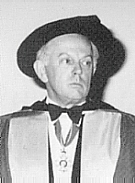Malcolm Williamson (1931-2003) : Represented Artist
|
|
Random Audio Sample: Sinfonietta : full orchestra by Malcolm Williamson, from the CD Epitaphs |
- Browse works by Malcolm Williamson
- Browse recordings available to purchase featuring music by Malcolm Williamson
- Browse articles by and about Malcolm Williamson
- Browse events featuring music by Malcolm Williamson

Malcolm Williamson was born in Sydney in 1931. He began piano studies with Alexander Sverjensky at the Sydney Conservatorium in 1943 while he was a boarder at Barker College, and after leaving school in 1947 studied composition at the Conservatorium with Alex Burnard and, later, Eugene Goossens. He left the Conservatorium in late 1949 without graduating. Upon moving to London in 1950 he discovered the serial music of the second Viennese school and that of composers such as Messiaen and Boulez. He continued his compositional training in 1953, studying under Elisabeth Lutyens and, later, Erwin Stein.
During this period Williamson was supporting his art by employment in an assortment of jobs: he worked as a proofreader for a publishing house, as an organist and choirmaster in a parish church, and as a pianist in a nightclub. His exposure to these different types of music was reflected in his own compositions of the time, as were the influences of Stravinsky, Messiaen, and the music of the late nineteenth-century German and Italian operatic composers. Williamson converted to the Roman Catholic faith around this time and this was an important influence on his music.
Williamson was fortunate enough to have been able to devote himself entirely to composition since the early 1960s - in the catalogue to celebrate his 50th birthday, produced by his publishers, he was described as "the most commissioned composer of his generation" - and in 1975 became the Nineteenth Master of the Queen's Music, the first non-Briton ever to have held that position. His compositional output included symphonies, stage works, chamber, choral and religious music, and film scores. He also had a keen interest in composing music for children. He composed a number of operas for children, including one based on Oscar Wilde's The Happy Prince, and 'cassations', miniature operas for audience participation which were initially inspired by a desire to teach his own children the mechanics of opera. From his interest in music for the young, Williamson also developed an interest in music for the mentally and physically handicapped.
Despite residing in the UK from the 1950s onwards (his appointment to the Queen required that he live in Britain) Williamson still considered his music as being fundamentally Australian: "Most of my music is Australian," he said on one occasion, "Not the bush or the deserts, but the brashness of the cities. The sort of brashness that makes Australians go through life pushing doors marked pull."
Williamson received the CBE in 1976, a year after his appointment as Master of the Queen's Music, and the AO for services to music and the mentally handicapped in 1987. The University of Melbourne conferred an Honorary Doctorate of Music upon him in 1982.
Malcolm Williamson died in March 2003, aged 71.
Selected Commissions
| Work | Commission Details | |
|---|---|---|
| Brilliant and the dark : opera | Commissioned by the National Federation of Women's Institutes. | |
|
|
Mass of a medieval saint : organ solo | Commissioned by Lee H. Bristol, Jr. |
| Symphony for organ : organ solo | Commissioned by Allan Wicks | |
|
|
Concerto for two pianos and strings (piano with string orchestra) (1972) | Commissioned by Astra Chamber Orchestra. |
|
|
Pas de quatre (quintets: flute, oboe, clarinet, bassoon, piano) (1967) | Commissioned for the Metropolitan at Newport Festival, Rhode Island, U.S.A |
|
|
Sinfonietta : full orchestra (1965) | Commissioned by the BBC for the Inaugural Concert of the Radio 3 Music Programme, 21st March 1965. |